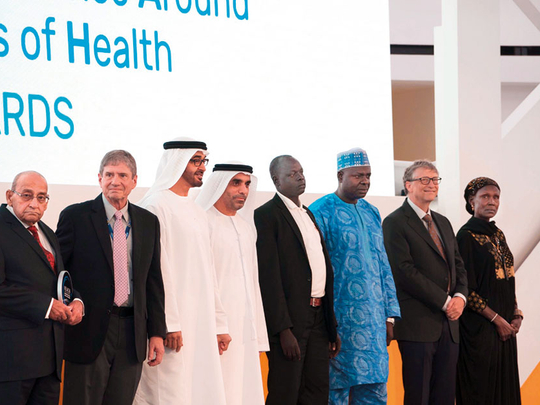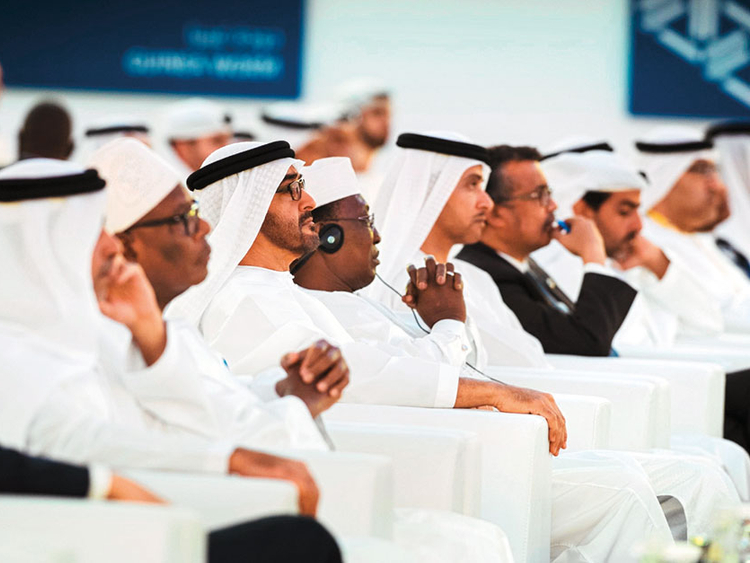
Abu Dhabi: A new $100 million (Dh367 million) fund was launched in Abu Dhabi on Wednesday to end river blindness and lymphatic filariasis (LF), two preventable infectious diseases, in Africa and the Middle East.
His Highness Shaikh Mohammad Bin Zayed Al Nahyan, Crown Prince of Abu Dhabi and Deputy Supreme Commander of the UAE Armed Forces, personally contributed $20 million (Dh73.46 million) to the Reaching the Last Mile fund, and the Bill and Melinda Gates Foundation is also expected to grant up to $20 million (Dh73.46 million) towards it. The funds will be managed by END Fund, a private investment platform dedicated to ending five common neglected tropical diseases. Shaikh Mohammad Bin Zayed and Gates launched a call to action for the remaining $60 million (Dh220 million ) to be raised.
The announcement was made at the Reaching the Last Mile conference, where more than 200 government officials, philanthropists, activists, medical professionals and social workers met to discuss the development and challenges towards tackling infectious diseases.
Attending the conference, Mohammad Bin Zayed and Bill Gates, Microsoft founder and co-chair of the philanthropic Bill and Melinda Gates Foundation, also presented awards to five individuals who made significant progress in the fight against guinea worms. The Recognising Excellence Around Champions of Health (Reach) awards also recognised former US President Jimmy Carter for being a long-term advocate for action against guinea worm disease.
In turn, Mohammad Bin Zayed conferred the Federation Honour upon Gates for his tireless work to aid humankind.
“International cooperation and collective action is our way to address the health challenges that afflict humanity,” Mohammad Bin Zayed tweeted last night, welcoming delegates to the conference.
Dr Maha Barakat, adviser to the executive office of the Abu Dhabi Government and board member of a global framework for coordinated action against malaria — the Roll Back Malaria Partnership, said 1.58 billion people around the world were still affected by neglected tropical diseases each year, including conditions like river blindness, LF and guinea worm disease.
“The world eradicated small pox in 1980, and this gives us the biggest hope against preventable diseases. Two other diseases have also seen a 99.9 per cent drop in global cases, and are now in the last mile: polio and guinea worm disease,” Dr Barakat said.
The UAE has long supported polio eradication efforts, contributing more than 200 million doses of vaccine to remote areas in Pakistan and Afghanistan since 2014, and galvanising support to raise $4 billion (Dh14.69 billion) at the 2013 Global Vaccine Summit. This year, only 14 cases have been reported among a single community living in Pakistan and Afghanistan, down from 350,000 infected people in 1988.
“In fact, Shaikh Mohammad Bin Zayed personally donated $205 million (Dh753 million) to offer polio vaccinations, and it is this kind of the effort and commitment that is needed to combat any infectious disease,” she added.
Today, only one of the three known strains of the virus remains, and experts have earmarked 2018 as a possible date of global eradication.
“Yet, failing to eradicate polio could lead to 200,000 new cases every year within a decade’s time,” Dr Barakat warned.
Shaikh Mohammad had also previously granted $30 million (Dh110 million) towards fighting malaria, which still infects 212 million people in 91 countries annually.
Wiping out guinea worm disease has also been a priority for the UAE, and the country’s founding father, Shaikh Zayed Bin Sultan Al Nahyan, provided $5.77 million (Dh21 million) in 1990 to support global efforts to fight it.
The disease is caused by parasitic worms that are still endemic to certain African countries, and 26 cases have been reported this year (2017) in Chad and Ethiopia.
“The disease, which is transmitted through the consumption of contaminated water, does appear to be in the last mile. A few years ago, cases were still being reported in Mali, Chad, South Sudan and Ethiopia. But none have been reported in South Sudan this year, and in Mali since 2016,” said Dr Dean Sienko, vice-president for health programmes at The Carter Centre. The Centre, a philanthropic organisation established by former US President Jimmy Carter, has taken the lead in combating guinea worm disease.
“To eradicate this disease, we need to encourage people to drink from safe sources while also working with governments to decontaminate water bodies. For a complete eradication, we will also have to control the disease from spreading to animals, and this could take a few years,” Dr Sienko added.
Reaching the Last Mile conference
The conference convened experts, social workers and philanthropists to discuss the global fight against infectious diseases, and spur concrete action on the ground.
Two infectious diseases were said to be ‘in the last mile’ because there has been a 99.9 per cent drop in the number of cases globally, and experts are hoping that they will be eradicated completely soon.
Polio: The disease is caused by a virus, but only one of three strains remains today. It affects young children who have not received the proper vaccines, and can cause permanent paralysis or even become fatal when the virus affects the central nervous system. Only 14 cases have been reported in Pakistan and Afghanistan this year.
Guinea worm: Drinking contaminated water passes on the guinea worm larvae to the patient, and the worms eventually exit the body through a long process that causes a painful, intensely burning sensation. Through the decontamination of water bodies and active efforts to encourage consumption of safe water, only 26 cases have been detected this year in Chad and Ethiopia.
Other infectious diseases were also discussed.
Malaria: A mosquito-borne disease that causes symptoms like fever and exhaustion, and coma or death in severe cases. 212 million people were infected in 91 countries this year.
River blindness: An eye and skin disease that is caused by parasitic blackflies, and that can lead to irreversible blindness and infections over time. In 2017, 18 million people in 36 countries have been infected, mainly in West African communities.
Lymphatic filariasis: A parasitic condition brought about by worms that are transmitted through the bites of infected mosquitoes. LF causes painful and visible disfigurations, including grossly enlarged limbs, and can lead to permanent disability. 40 million people in 53 countries have contracted it in 2017.
Trachoma: A bacterial infection that damages the inner surface of the eyelids and can cause eventual blindness. 200 million people are at risk of developing it, and over 3.2 million people are at immediate risk from ingrown eyelashes.
Reach awards
Five individuals were also awarded for their efforts towards combating guinea worm disease over the past 30 years, as part of the first Recognising Excellence Around Champions of Health (Reach) awards.
Lifetime Achievement Award: Former US President Jimmy Carter was selected for being a long-term vocal champion for the eradication of the disease.
Special Achievement Award: Abdullah Al Ghafli, director of the UAE Pakistan Assistance Programme, was given for forging new partnerships to drive eradication efforts.
Courage Award: Dr Nabil Awadalla, former national programme coordinator at the Sudanese Ministry of Health, was recognised for his efforts against the condition, often at great personal risk.
Last Mile Award: Dr Adamu Sallau, director of the integrated health programmes for Imo and Abia states in Nigeria at The Carter Centre, was honoured for his efforts in eliminating guinea worm disease within Nigeria.
Unsung Heroes Award: This was jointly presented to Regina Lotubai, 45, a social mobiliser who created songs and rhymes to create awareness about the disease in South Sudan, and Daniel Madit, 34, a frontline health worker and now programme officer at South Sudan’s Ministry of Health. Both had helped the country made significant strides against the disease, with no case being reported in 2017.













